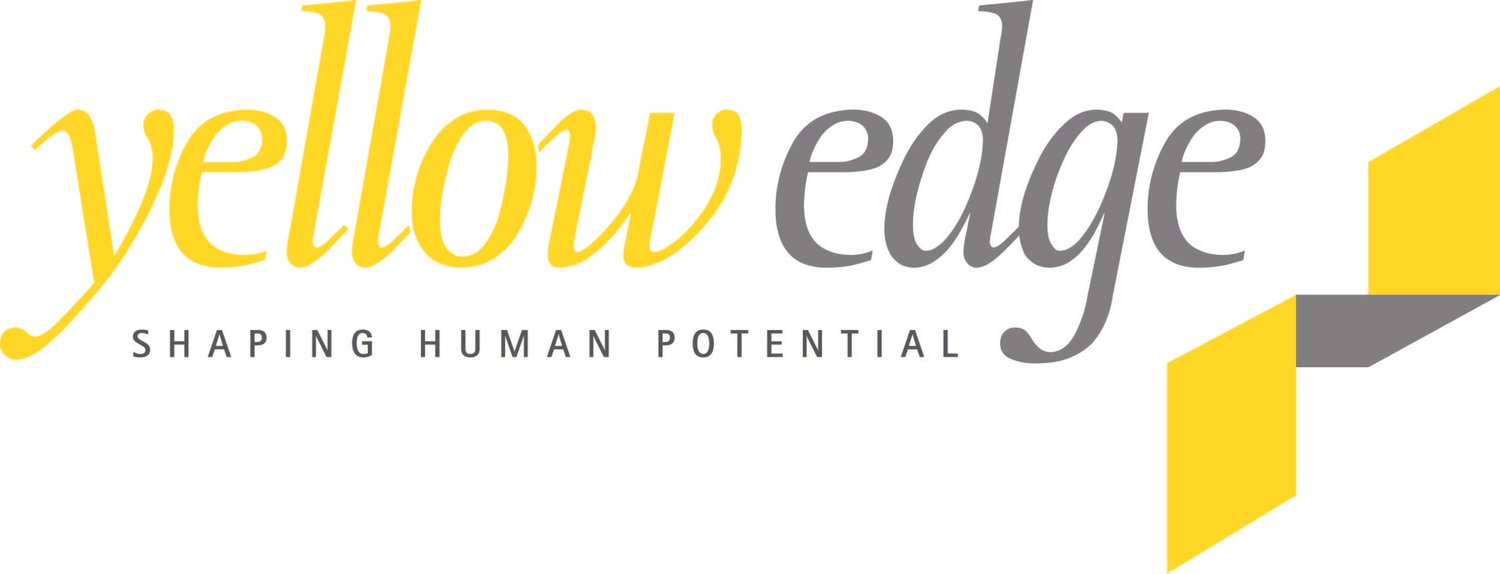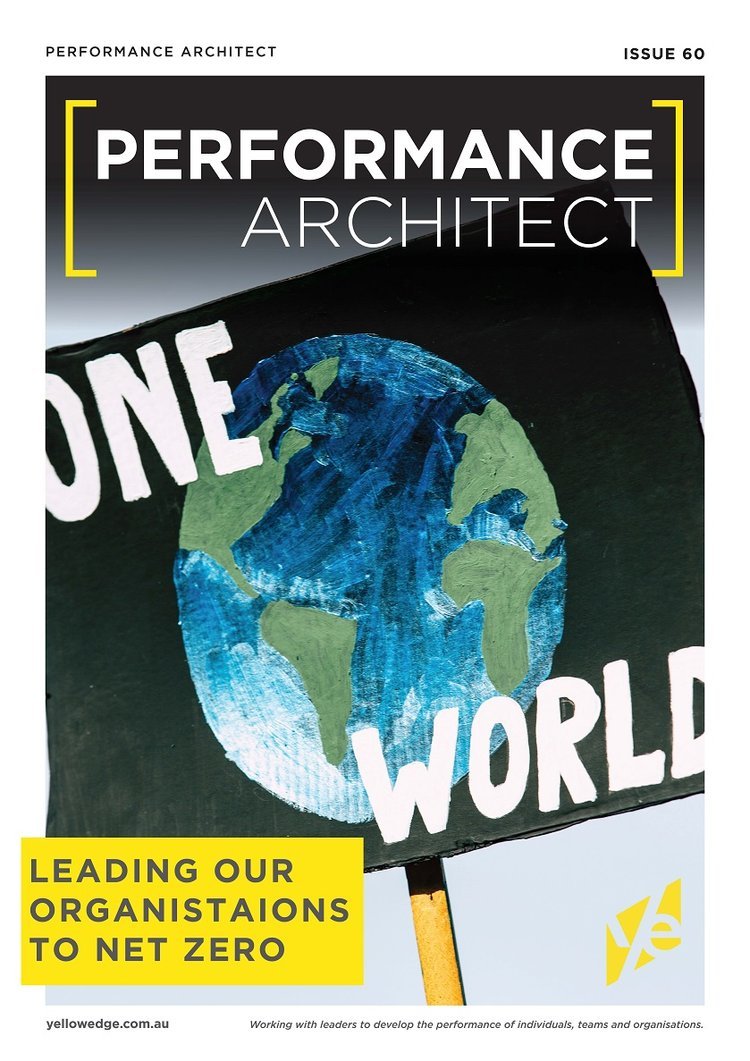60. Leading Our Organisations to Net Zero
by Andrew Simon
Net zero discussions, reporting and debates have been for most part, and continue to be, about the targets that countries commit to and the national policies and roadmaps formulated and adopted to get them there. These national level discussions, targets, agreements and protocols are critical of course, but I have been wondering about what an ordinary company like Yellow Edge can do to play its part, to become as it were, a net zero company. How do we lead our organisations to net zero?
have been struck for a while now by the concept of the ‘Enterprise Leader’. Coined in 2004 by Douglas Ready, an enterprise leader is someone who, irrespective of their place in a hierarchy, is concerned with the wellbeing of the broader entity. They are not tribalists. Their interests transcend their immediate areas of responsibility. They operate across boundaries and silos and focus a lot of their time on the wider good, recognising that this brings benefit to all parts.
It’s an appealing if ambitious concept. One that requires leaders to think about the collective, the social networks within an organisation, those that extend outwards and those that feed into it. An enterprise leader for example, understands the value of supply and distribution chains and how one part in the web of relationships can impact on the broader network.
The concept feels like a useful way of thinking about leadership in organisations headed for a net zero world. Getting to net zero feels like a big, hairy audacious goal, to use Jim Collins’s famous phrase and it will need big, bold thinking and require joint, collective, collaborative effort. After all, net zero doesn’t work if it’s only adopted by some or in a piecemeal fashion. It only works when everyone is part of the solution.
As so, at Yellow Edge, we have begun to use enterprise leadership as a kind of framework that leaders might adopt as they grapple with the task of leading to net zero. Our emerging framework has three foundational components:
1. Larger circles of concern
Leadership development orthodoxy encourages us to reduce our circles of concern so we can focus and have more control. To lead to net zero however, we believe that enterprise leaders need to have larger circles of concern. They have to work with others to effect change within their organsiations as well as within their supply and distribution chains and in their broader business ecosystem.
Enterprise leaders contribute to public net zero debates with an informed point of view. Many businesses understand that getting next zero is not just vital for the planet and humanity, its also good for business as it inherently is about sustainability, and a sustainable business is a great business. Enterprise leaders look for the discussion and experimental spaces available where they can offer and co-create ideas and potential solutions to organisational decarbonization, carbon mitigation and carbon neutral or negative ways of operating.
Enterprise leaders see it as their role to lead their organisation’s wider ecosystem, proactively leading change in consumer and supplier behavior, industry norms and government policy. This is what good business does anyway, but this time it’s for a very different outcome. The capability, business processes, creativity and talent are already available in businesses to make a bigger difference, it’s now about harnessing all of this for net zero.
Larger circles of concern also mean that enterprise leaders advocate for public and private investment in:
clean power (e.g. investments in wind, solar, grids, batteries and hydrogen)
clean transport (car charging infrastructure, electric public transport)
clean buildings and heating (insulation, renewable heat, home energy)
natural capital (tree planting, environmental rehabilitation, support to farmers for more sustainable kinds of agriculture)
green jobs (organising the kind of education and training that is needed to create new jobs in the labour-intensive parts of all this)
2. Net zero as an organising principle
An operating principle represents a conscious choice and leading to net zero requires being alive to the choices we make recognising that they have an accumulative and long-term impact on people and the world around us.
Adopting net zero as an operating principle would mean that an organisation would envision how it can become net positive contributor to people and planet and how it can be a force for good. This is a radical idea, for when one notices and thinks about the many glib vision statements around us, you realise very quickly how self-absorbed, inward looking and self-referential many of these vision statements are.
Net zero as an organising principle would mean reframing what success looks like and how employees might be encouraged to think globally to act locally. Net zero as an organising principle would mean fostering responsible citizenship within the organisation and its operating ecosystem.
These are not minor endeavours. They reflect big choices which come with significant accountabilities. But perhaps the times we live in demand this of us and of our organisations.
3. Leading for the future
Orthodox self-help gurus exhort us to live in and for the present. But perhaps we have been living in the present for too long and we now realise that our futures are compromised because we have not lived for it. Leading to net zero is an inherently future focused endeavour. Critically important work takes place now of course, but it is also a deposit and a form of re-investing in the future to ensure its sustainability.
This means that the work we do as enterprise leaders is different. Enterprise leaders try and break free from the shackles of the day to day to think about the future, to scenario and contingency plan, to consider strategic risks, anticipating and scanning the horizon and preparing people for the opportunities ahead. This is not about crystal ball gazing, rather it’s about lifting our gaze beyond the here and now. Its about preparedness and sustainability. We can never be prepared if we only ever live in the present.
Developing enterprise leaders
As a company concerned with the development of leaders, we are also putting considerable thought into how we build organisational and community enterprise leadership that can lead to net zero. Here are some questions we are asking ourselves:
How can we:
provide leaders the chance to develop relationships with people experiencing some of the world’s most pressing climate change challenges, and also with people working to help address these challenges?
support leaders to make their own sense of these experiences and relate them to their organisational roles through action learning, business challenges, hackathons, strategic projects, and exposure to individuals in their own organisations already modeling this way of leading?
provide leaders a chance to engage with new ideas to help make sense of the demands of this new business context like ecology, complexity, systems thinking and social constructionism, and how these link with business language through new concepts like ‘shared value’, ‘circular economy’, ‘integrated reporting’ and ‘public good’?
help leaders develop and articulate their own authentically held view on the purpose of their work, and the value it creates for society as a whole?
Leading organisations to net zero is literally a greenfield activity. No one yet has a monopoly on knowledge of how to do this fully and maybe that’s a good thing. It may mean that people and leaders in organisations, companies and communities will need to think beyond their silos to collaborate to find paths forward together.
For some resources and references, go to: Leading to Net Zero
by Andrew Simon, Co-Founder and Chief Executive, Yellow Edge. June 2022
Yellow Edge is a local, privately owned Canberra based consulting company focused on helping individuals, teams and organisations to achieve high performance. Yellow Edge is a certified BCorp. BCorp companies make decisions that make a positive impact on their employees, customers, suppliers, community, and the environment. https://www.bcorporation.com.au/
Cover photo by Markus Spiske


